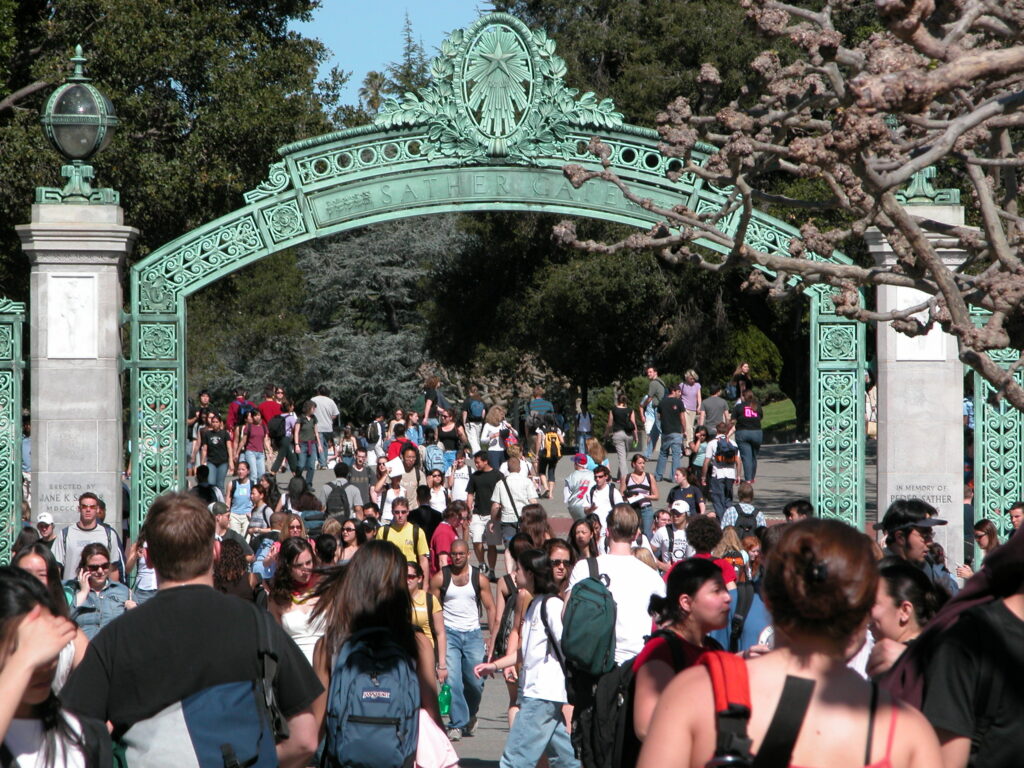
Students pass beneath Sather Gate and onto Sproul Plaza at UC Berkeley.
Credit: Steve McConnell / UC Berkeley
Top Takeaways
More than three-quarters of California grads — 78% — have a positive ROI.
California ranks third behind Washington, D.C., and New York.
Some experts say Americans are increasingly concerned that not all degrees pay off.
More than three-quarters of graduates from California’s public four-year universities have had a positive “return on investment,” the financial benefit they receive from their education compared to what they invested.
That’s according to a new analysis released Thursday by the Strada Education Foundation. The study defines a positive return on investment (ROI) to mean that college graduates earn more than people of the same age without college degrees, and over a decade those increased earnings add up to more than what they invested in their college educations.
The study finds that nationwide, 70% of recent public college graduates can expect a positive ROI within 10 years, including 73% of bachelor’s degree graduates and 60% of associate degree graduates. But the figures vary widely by state.
California is third (78%) in the nation for the percentage of college graduates with bachelor’s degrees with a positive “return on investment,” according to the analysis. Washington, D.C., has the highest rate with 82%, followed by New York with 80%.
A smaller percentage, though still more than half — 58% — of those who receive an associate’s degree from California community colleges have a positive return on investment in college, which is lower than 35 other states, according to the study. A separate study recently released by the College Futures Foundation and the HEA Group found that students who finish degrees or certificates at California community colleges earn back their tuition investment within a year or less, while graduates from other schools, especially more expensive private for-profit trade schools, struggle to do so.
There’s debate about the best way to measure college ROI, but lately there’s been a shift toward comparing the earnings of college graduates to those who didn’t get a degree. Some other measures look at the lifetime earnings of a graduate compared with the full cost of their education.
A wide body of research suggests a bachelor’s degree is still worth the cost in most cases, but experts say Americans are increasingly aware that not all degrees pay off.
California students often have to weigh the cost of attending college — including tuition, housing, textbooks, and time invested — against the value, said Joshua Hagen, vice president of policy and advocacy for the nonprofit organization Campaign for College Opportunity.
“They want to make sure before they commit to college that the inputs are going to be manageable and the outputs are going to be worth it,” Hagen said. “These studies often focus on earnings and wages, but students often talk about, ‘Can I get a good job in the field I’m interested in? And is it even still going to be around when I graduate?’”
These questions are “higher stakes,” he said, for low-income students and those from historically marginalized backgrounds.
The Strada study compared return on investment by different racial and ethnic groups of college graduates nationwide and found that Asian men (80%) and Pacific Islander and Native Hawaiian women (81%) were the most likely to see a positive ROI from their college education, followed by white women (79%) and Asian women (77%). Black students were the least likely to see a positive ROI, with 66% of Black men and 69% of Black women. Among Latino students, 72% of women and 68% of men saw a positive ROI.
Josh Godinez, board director for the California Association of School Counselors and assistant principal at Centennial High School in the Corona-Norco Unified School District in Riverside County, said in recent years that school counselors in California have made a shift away from focusing on four-year universities.
“We’re helping kids whether they want to be a cosmetologist, a doctor, a plumber, HVAC, whatever it is,” Godinez said. “We want to celebrate every avenue after high school.”
As students and lawmakers increasingly question the value of a college degree, universities across the country are working to prove their “return on investment.”
The term has been plastered on college advertisements across the country, and some states have started publishing annual reports on the ROI of their colleges.
California’s public colleges and universities have also taken every opportunity to share positive reports about their return on investment.
The University of California has a dashboard on alumni outcomes, plus several different posts about the value of an education in the nine-campus system.
“The value of a University of California degree is well supported by the facts,” wrote UC spokesman Stett Holbrook, adding that “UC bachelor’s degree-holders outearn both high-school graduates and other college graduates in California within six years of graduation” and that “UC campuses are ranked top in the country for social mobility and value, helping students move up the economic ladder.”
Last year, California State University published data from other studies showing a high return on investment for students from low- and moderate-income families. And the California Community Colleges system has a substantial section on return on investment on their website, claiming, for instance, that “for every dollar students spend on their community college education, they gain $5 in higher earnings in the future.”
Collin Binkley of the Associated Press contributed to this report.
